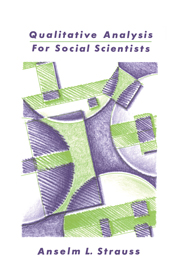Book contents
- Frontmatter
- Contents
- Preface
- 1 Introduction
- 2 Two illustrations
- 3 Codes and coding
- 4 Seminar on open coding
- 5 Memos and memo writing
- 6 Team meetings and graphic representations as memos
- 7 Excerpts that illustrate common problems
- 8 Integrative diagrams and integrative sessions
- 9 Integrative mechanisms: diagrams, memo sequences, writing
- 10 Presenting case materials: data and interpretations
- 11 Grounded formal theory: awareness contexts
- 12 Reading and writing research publications
- 13 Questions and answers
- 14 Research consultations and teaching: guidelines, strategies, and style
- Epilogue
- Appendix Discovering new theory from previous theory
- References
- Author index
- Subject index
5 - Memos and memo writing
Published online by Cambridge University Press: 26 January 2010
- Frontmatter
- Contents
- Preface
- 1 Introduction
- 2 Two illustrations
- 3 Codes and coding
- 4 Seminar on open coding
- 5 Memos and memo writing
- 6 Team meetings and graphic representations as memos
- 7 Excerpts that illustrate common problems
- 8 Integrative diagrams and integrative sessions
- 9 Integrative mechanisms: diagrams, memo sequences, writing
- 10 Presenting case materials: data and interpretations
- 11 Grounded formal theory: awareness contexts
- 12 Reading and writing research publications
- 13 Questions and answers
- 14 Research consultations and teaching: guidelines, strategies, and style
- Epilogue
- Appendix Discovering new theory from previous theory
- References
- Author index
- Subject index
Summary
In this chapter, a number of theoretical memos written by researchers during their various studies are reproduced. Before reading and studying them, it is requisite to at least scan the earlier discussion in Chapter 1 about memos and their indispensable functions in discovering, developing, and formulating a grounded theory. In the previous chapter on the student seminars as well in later chapters, one can frequently sense the hovering presence of memos which arise out of codes and ideas generated in seminar, consultation, and team sessions. In fact, one explicit rule of thumb is that such sessions must soon be followed by a jotting down or typing out of the summary or the thoughts stimulated, just as individual researchers need to interrupt their data collecting and coding to write memos. Furthermore, recollect that waiting for the muse to appear is not the model here. Although there are periods of intense memo writing, grounded theorists are trained to write memos regularly – often from the first days of a research project – and in close conjunction with the data collecting and coding. (See discussion of the triad, Chapter 1. See also Glaser 1978, pp. 83–92.)
The initial memos tend to look a little like those written by novices at this general style of memo writing: at first, a high proportion of them may be operational (what data to collect, where to go to do this), or reminder notes (don't forget to …, or don't forget this point), or scattered “bright ideas,” or fumbling around with a flood of undifferentiated products of coding, or just thinking aloud on paper for purposes of stimulation in order to see where that thinking will lead, and so on.
- Type
- Chapter
- Information
- Qualitative Analysis for Social Scientists , pp. 109 - 129Publisher: Cambridge University PressPrint publication year: 1987
- 1
- Cited by

